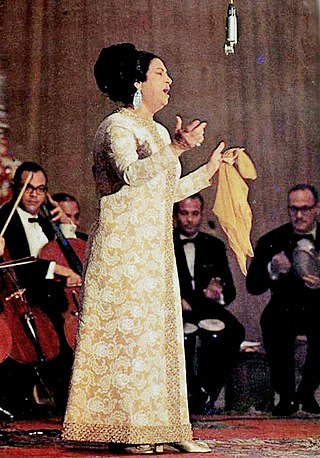
Umm Kulthum was an Egyptian singer, songwriter, and film actress active from the 1920s to the 1970s. She was given the honorific title Kawkab el-Sharq. Immensely popular throughout the Middle East and beyond, Kulthum is a national icon in her native Egypt; she has been dubbed "The Voice of Egypt" and "Egypt's Fourth Pyramid". In 2023, Rolling Stone ranked Kulthum at number 61 on its list of the 200 Greatest Singers of All Time.
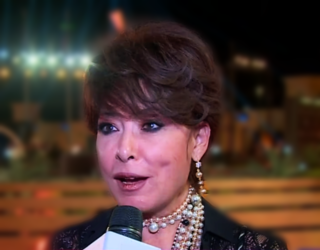
Vartanoush Garbis Selim, better known by her stage name Anoushka, is an Egyptian singer and actress.
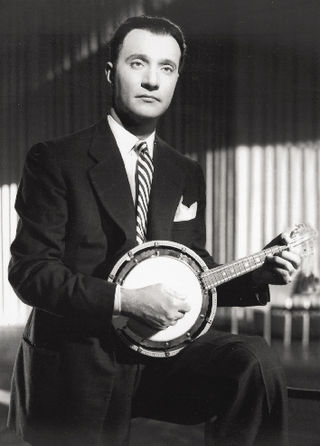
Mohamed Abdel Wahab, also transliterated Mehammad Abdelwehab, Egyptian Arabic pronunciation:[mæˈħam.mædʕæbdelwæhæːb], was a prominent 20th-century Egyptian singer, actor, and composer. He is best known for his Romantic and Egyptian patriotic songs.
Wagih Aziz is an Egyptian composer and singer who has had his debut back in 1988.

Leila Mourad or Layla Morad was an Egyptian singer and actress, and one of the most prominent superstars in Egypt and the entire Arab world in her era.

Imam Mohammad Ahmad Eissa or El Sheikh Emam was a famous Egyptian composer and singer. For most of his life, he formed a duo with the famous Egyptian colloquial poet Ahmed Fouad Negm. Together, they were known for their political songs in favor of the poor and the working classes.

Bilady, Bilady, Bilady is the current Egyptian national anthem. It was written by Mohamed Younis El-Qadi and composed by Sayed Darwish. It is derived from the words of Mustafa Kamel in one of his most famous speeches in 1907, in which he said: "My Country, my Country, for you is my love and my heart. for you is my life and my existence, for you is my blood, for you is my mind and my tongue, for you is my heart and my soul, for you are life.. and there is no life except with you, O Egypt." It was officially adopted in 1979, and was redistributed by the Egyptian musician Mohamed Abdel Wahab at the direction of the President Anwar El-Sadat.
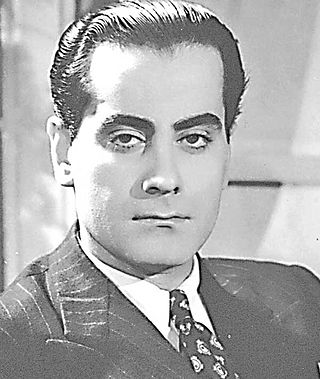
Farid al-Atrash, also spelled Farid El-Atrache, was a Syrian-Egyptian singer, oudist, composer, and actor. Although born in Syria, he immigrated to Egypt at the age of nine with his mother and siblings, where he eventually became one of the most noted figures in 20th-century Arabic music.
Dawood Hosni was an Egyptian music composer.

Sayed Mekawy was an Egyptian singer and composer, popular in Egypt and throughout the Arabic speaking world. Throughout his life, he remained undaunted by modern innovations and the attempts of rivals to produce another type of music. He was best known for his radio collaboration with Fuad Haddad on the character of the Egyptian tradition of El-Misaharati.

Baligh Hamdi was an Egyptian composer who created and composed many hit songs for several singers in the Arab world, especially during the 1960s and 1970s. He composed Warda's most famous songs, and the two got married for a long period.

"Wallāh Zamān, Yā Silāḥī" was the national anthem of the United Arab Republic (UAR), a federation of Egypt and Syria, from 1960. Though the UAR disbanded in 1961, Egypt retained it as the official name of the state until 1971, and used its national anthem until 1979. It was also used as the national anthem of Iraq from 1963 to 1981.

Hamza Namira is an Egyptian singer-songwriter and multi-instrumentalist. He has released three albums from the production of Awakening Records: Dream With Me, Insan, Esmaani; and a couple of albums from Namira production, his own foundation: Hateer Min Tany and Mawlood Sanat 80. Besides singing, for which he is mostly known, he has also worked in musical composition and arrangement. Hamza composed some of his own work, like the album heads Esmaani and Insan, along with some collaborations with other artists, like Maher Zain's song Ya Nabi Salam Alayka. He also contributed to arranging the cartoony remake Egyptian Jingle Bells, which was the first shaabi work in his repertoire, later followed by Esta3izo in his fourth studio album.

Mohamed Fawzi was an Egyptian singer-songwriter, actor, and filmmaker. He was a leading entertainer and impresario in the thriving musical film scene of Egypt in the 1940s and 1950s. He founded the El-Sharq El-Awsat record plant on April 30, 1959, and turned it into Sono Cairo /Sout El Qahira Records on January 6, 1964. Fawzi composed the music for "Kassaman", the Algerian national anthem, with lyrics by "poet of the Algerian Revolution" Moufdi Zakaria.
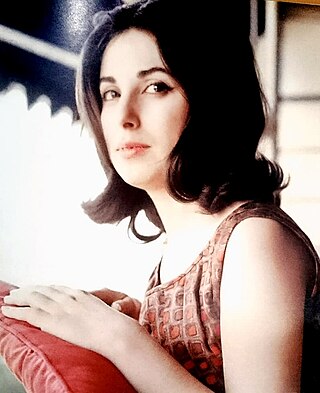
Nagat El-Sagheera is an Egyptian singer and actress. She retired from filming in 1976 and from singing in 2002. Nagat began her career at the age of five and retired 59 years later.
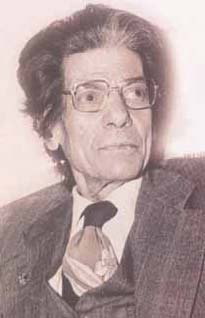
Riad Mohamed El Sunbati, also written as Riad Sonbati or Riadh Sonbati was a 20th-century Egyptian composer and musician who was considered an icon of Egyptian Music. The number of his lyric works is 539 works in Egyptian Opera, operetta, cinematic and religious song, poem, Taqtouqa and Mawalia. The number of song poets who he composed for is more than 120 poets. He composed for many famous Arab singers including Umm Kulthum, Fairouz, Asmahan, Warda Al-Jazairia, Najat Al Saghira, Mounira El Mahdeya, Fayza Ahmed, Saleh Abdel Hai, and Aziza Galal.

Atef Fahim Mohamed Montasser was an Egyptian record producer, A&R executive and the founder of Sout El-Hob Records. Montasser is credited with discovering singing talents in Egypt and the Arab world like Hany Shaker, Ahmed Adaweyah, Aziza Jalal, Mohammad Fouad, Medhat Saleh, Omar Fathi, El Masryeen, Four M and Metkal Kenawy. He is credited with bringing Algerian singer Warda to prominence.

Sout El-Hob Records is an Egyptian record label founded in 1972 by Atef Montasser. Sout El-Hob has the 4th largest Arabic music catalog in the Middle East & North Africa. It has also distributed many movies domestically and abroad under the name of “Sout El-Hob Movies." Mohsen also worked with Atef as a distributor before he set up his own company.

Fatheya Ahmed, also called Touha, was an Egyptian classical singer and actress who "carried the practice of Waslah into the 20th century". She also sang many traditional and modern melodies on Takht in the tradition of awâlim in which female entertainers perform for women-only audiences during wedding celebrations. She had a “unique mastery of the mawwal”, a traditional and popular Arabic genre of vocal music. She was known for singing poems and monologues, and sang some folk songs with Sayed Darwish, a popular Egyptian singer and composer. She sang in the 1943 film Ahlam el Shabab (1943).
Bahia Faraj Al-Awad, also known as Bahia, Bibi, and, most famously, Wedad was a Tunisian-Lebanese singer.

















